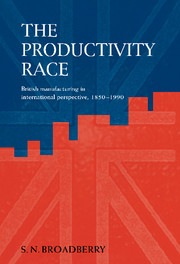Book contents
- Frontmatter
- Contents
- List of figures
- List of tables
- Acknowledgements
- Glossary of terms and company names
- 1 Introduction and overview
- Part 1 measuring comparative productivity performance
- Part 2 explaining compartive productivity performence
- Part 3 reassessing the performance of British industry
- 10 The rise of competition from abroad, 1850–1914
- 11 War and depression, 1914–1950
- 12 Changing markets and technology, 1950–1990
- 13 Concluding comments
- Bibliography
- Index
12 - Changing markets and technology, 1950–1990
Published online by Cambridge University Press: 28 October 2009
- Frontmatter
- Contents
- List of figures
- List of tables
- Acknowledgements
- Glossary of terms and company names
- 1 Introduction and overview
- Part 1 measuring comparative productivity performance
- Part 2 explaining compartive productivity performence
- Part 3 reassessing the performance of British industry
- 10 The rise of competition from abroad, 1850–1914
- 11 War and depression, 1914–1950
- 12 Changing markets and technology, 1950–1990
- 13 Concluding comments
- Bibliography
- Index
Summary
Introduction
British industry emerged from the Second World War highly dependent on home and Commonwealth markets, as was noted in chapter 7. The continued belief in the importance of the Commonwealth was an important part of the business environment in postwar Britain. It coloured the attitudes of businessmen, keen to return to the prewar cartels and to avoid direct competition with the United States and Germany. It also coloured the attitudes of politicians, who remained ambivalent about participation in supra-national European institutions such as the European Coal and Steel Community (ECSC) and the European Economic Community (EEC). Thus until Britain joined the EEC in 1973, British industry was to some extent shielded from international competition. Since anti-trust policy was also applied rather hesitantly during this period, domestic competition was also relatively restrained. The strengthening of competitive forces in Britain on both the international and domestic fronts during the 1970s and 1980s represents a major change in the business environment.
The Second World War also left its mark on technology in British industry. During the war, many British industrialists were brought face to face with the much higher labour productivity achieved in American industry, as the two economies were integrated in the Allied war effort. Wartime visits by British industrialists to the United States were followed up after the war by the Anglo-American Council on Productivity (AACP), which sponsored visits by productivity teams made up of managers and trade unionists in a wide range of industries. However, attempts to adopt American technology in British conditions were not very successful.
- Type
- Chapter
- Information
- The Productivity RaceBritish Manufacturing in International Perspective, 1850–1990, pp. 292 - 394Publisher: Cambridge University PressPrint publication year: 1997



